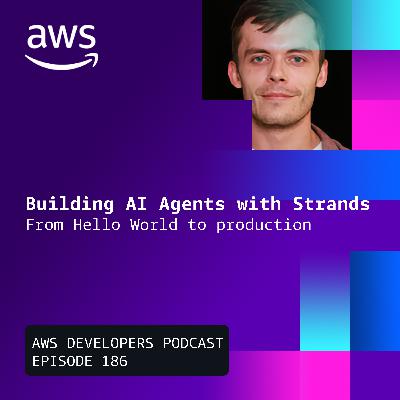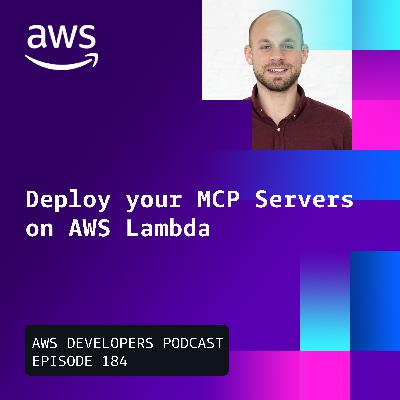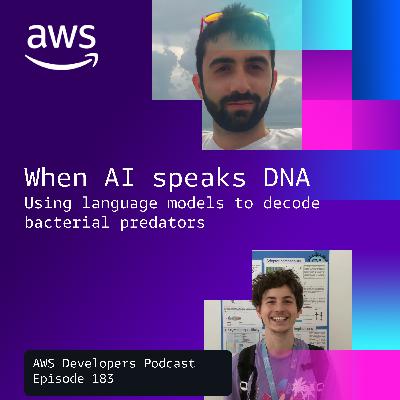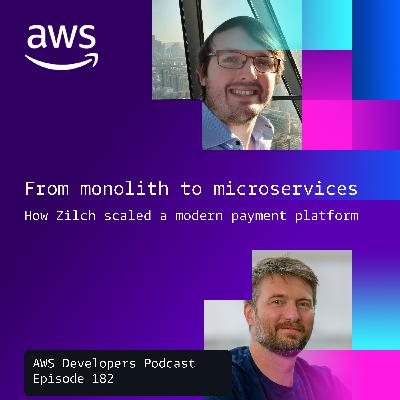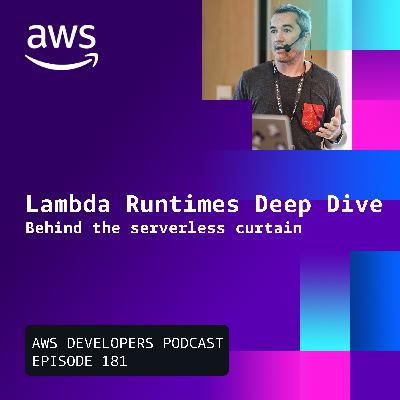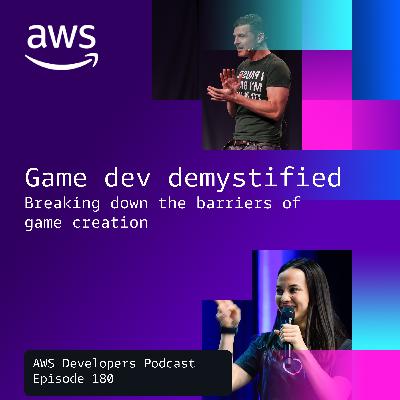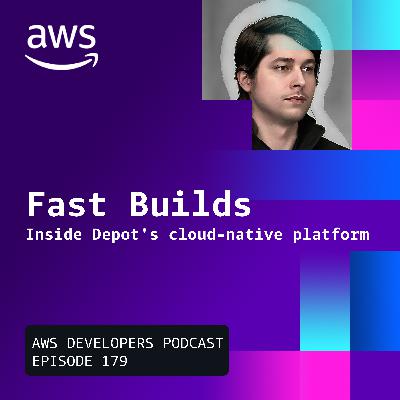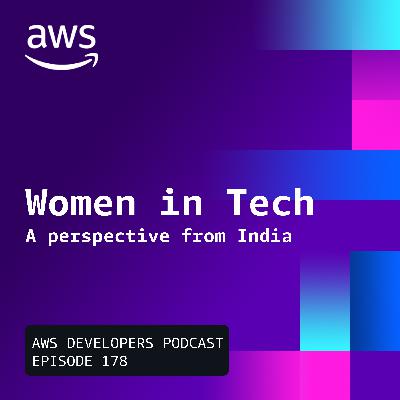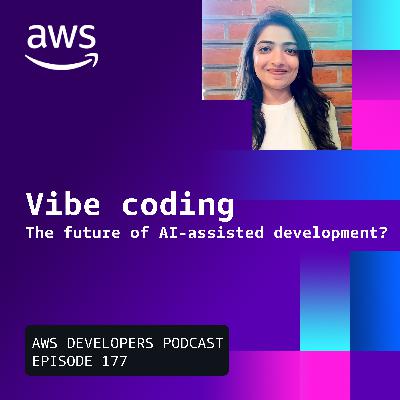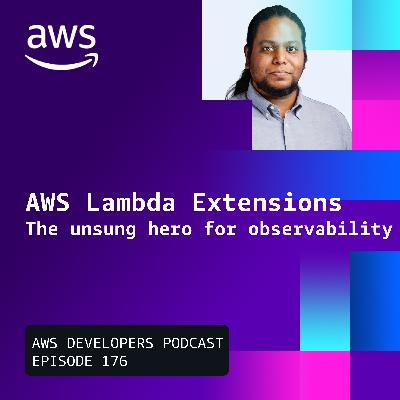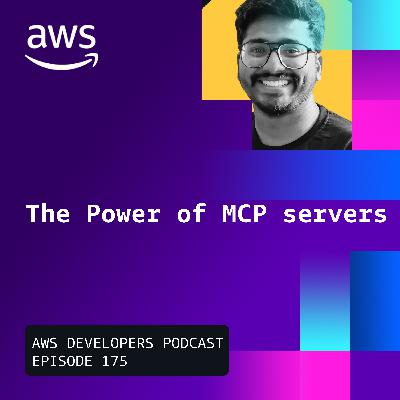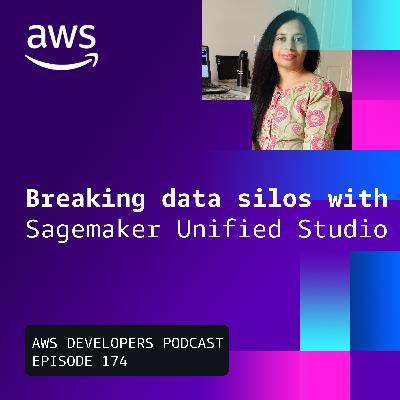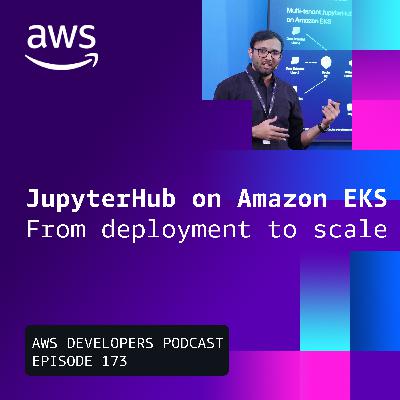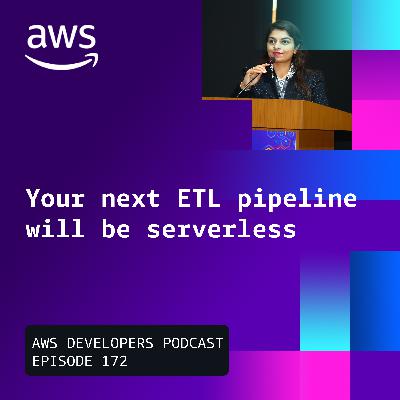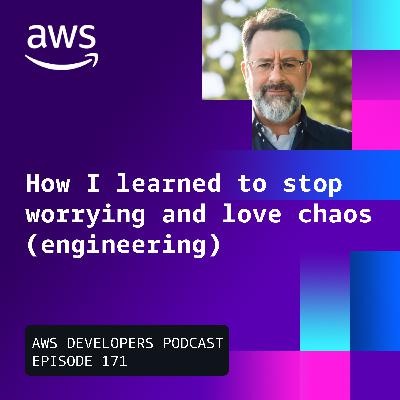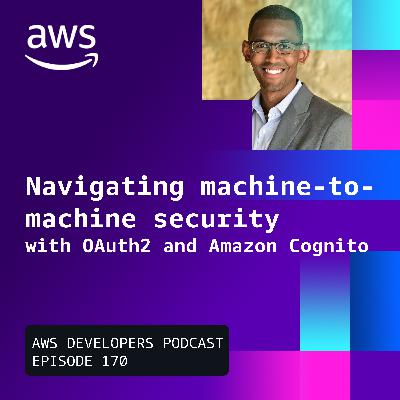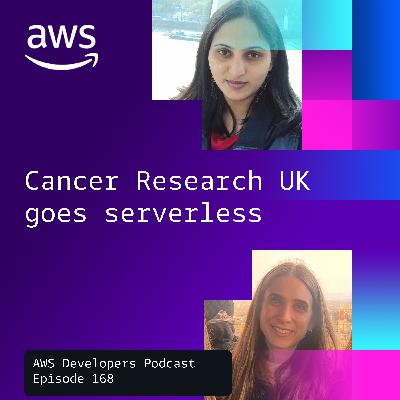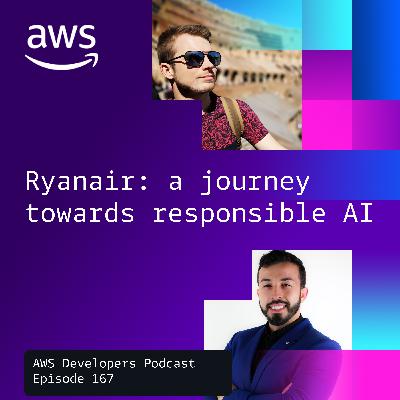Discover The AWS Developers Podcast
The AWS Developers Podcast

186 Episodes
Reverse
In this episode of the AWS Developers Podcast, we dive deep into Strands Agents, AWS's open-source framework for building AI agents. Our guest Arron Bailiss, Principal Engineer and Tech Lead for Strands, explains how this framework evolved from an internal AWS tool to a developer-friendly, open-source solution. Learn how Strands simplifies AI agent development with just a few lines of code while maintaining production-ready capabilities. Aaron discusses the framework's unique model-driven approach, its support for both MCP and A2A protocols, and how it powers various AWS services including Amazon Q Developer and AWS Glue. Discover how Strands enables multi-agent systems through swarms, supports various deployment options, and get insights into the roadmap including TypeScript support and voice agent capabilities.
In this episode, we dive deep into Moonpig's migration journey from an on-premise ASP.NET monolithic application to a fully serverless architecture on AWS. Richard Pearson, Head of Engineering, and Alexis Lowe, Principal Engineer at Moonpig, share their experience transforming a 25-year-old e-commerce platform. They discuss how they tackled the challenges of migrating from SQL Server to DynamoDB, implemented multi-region deployment, and achieved seamless scalability for their peak trading periods. Learn about their "no VPC" policy, their approach to observability, and how they organized their teams to embrace DevOps culture. This episode is particularly relevant for organizations considering a similar journey to serverless architecture or looking to scale their platforms globally.
In this episode, we dive deep into MCP (Model Context Protocol) servers on AWS Lambda. We explore what MCP is, how it enables AI systems to interact with tools through standardized protocols, and practical implementations on AWS Lambda. The discussion covers authentication mechanisms, deployment strategies, and the future potential of MCP servers as a marketplace for AI capabilities. Whether you're building AI-powered applications or interested in exposing your business capabilities to AI systems, this episode provides valuable insights into the technical aspects and business opportunities of MCP servers.
In this episode, we explore how Phagos, a French biotech startup, combines biology, data science, and cloud computing to combat antimicrobial resistance. Their innovative approach uses bacteriophages - natural predators of bacteria - as an alternative to antibiotics. We discuss how they leverage AWS services, including SageMaker and batch processing, to analyze genomic data and train specialized language models that can predict phage-bacteria interactions. Our guests explain how they process terabytes of genetic data, train and deploy AI models, and create user-friendly interfaces for their lab scientists. This fascinating conversation reveals how cloud computing and artificial intelligence are revolutionizing biotechnology and potentially helping solve one of this century's biggest health challenges.
Join us for an insightful conversation with Mike Davis, Engineering Manager, and Rob Nelson, VP of Engineering at Zilch, a leading UK-based buy now pay later platform. Discover how this cloud fintech scaled from a monolithic architecture to a sophisticated microservices ecosystem serving 5 million customers. Learn about their journey migrating from MSSQL to Aurora, their innovative use of AWS services including EKS, SNS/SQS for event-driven architecture, and API Gateway for WebSocket connections. The discussion explores their unique implementation of push notifications, in-app messaging, and how they leverage generative AI for merchant discovery. Get a behind-the-scenes look at their fraud detection system using Kinesis and Flink, and hear about their upcoming physical card launch.
In this episode, we dive deep into AWS Lambda runtime environments with Maxime David, Software Development Engineer in the Lambda runtime team. Discover how AWS manages and updates the foundation of serverless computing, ensuring millions of functions continue to run smoothly while being patched and updated behind the scenes. Learn about the complex deployment processes, security considerations, and the team's commitment to maintaining backwards compatibility. Maxime explains how Lambda runtimes are structured, from the operating system to language support and AWS SDK integration. We also discuss custom runtimes, the role of Firecracker in providing isolation, and the team's efforts toward open-sourcing their work
In this episode, we dive deep into the world of game development with our special guest Matheus, a former game developer turned AWS Developer Advocate. We explore why and how to get started in game development, discussing everything from game engines to the technical challenges of creating games. Matheus shares his personal journey from Brazil to becoming a game developer, and provides practical advice for developers looking to enter the gaming industry. We cover essential topics like game physics, matchmaking engines, testing strategies, and the intersection between game development and cloud computing. Whether you're a seasoned developer curious about gaming or a complete beginner, this episode offers valuable insights into the creative and technical aspects of game development. This episode is also available on video https://www.youtube.com/watch?v=9RTglcxR9QA
In this episode, Jacob Gillespie, co-founder and CTO of Depot, reveals how they're changing CI/CD by making builds dramatically faster. Learn how Depot achieves up to 40x speed improvements through innovative use of AWS services, sophisticated caching mechanisms, and custom low-level optimizations. Jacob shares technical details about their architecture, from EC2 instance management to distributed storage solutions, and explains how they handle everything from container builds to macOS development. Whether you're struggling with slow builds or interested in cloud-native architecture, this episode offers valuable insights into modern CI/CD optimization.
This episode of the AWS Developers Podcast focuses on the empowerment of women in technology, particularly in India. The conversation highlights personal journeys of women in tech, the challenges they face, the importance of mentorship, and the need to break stereotypes surrounding women in the tech industry. The speakers share their experiences, insights, and advice for aspiring women in tech, emphasizing the significance of community support and the role of male allies in fostering an inclusive environment.
Join us for an exciting episode recorded live from AWS Summit India in Bangalore, where we dive deep into 'Vibe Coding' with Amazon Q. Our special guest Omshree, an AWS Community Builder and Cloud Engineer, shares her journey of transforming tedious coding tasks into enjoyable experiences using AI-assisted development. Discover how Amazon Q Developer CLI is transforming the way developers build applications, from games to enterprise solutions. Learn about best practices for prompt engineering, the future of AI in software development, and practical insights on maintaining the balance between AI assistance and human expertise. Whether you're a seasoned developer or just starting out, this episode offers valuable perspectives on how AI is reshaping the coding landscape while keeping developers firmly in the driver's seat.
In this episode recorded live from AWS Summit Bangalore, we dive deep into AWS Lambda Extensions and Observability with Jones, a serverless hero and developer advocate at New Relic. Learn about the critical role of observability in serverless architectures, how Lambda Extensions work as sidecars to enhance monitoring capabilities, and the different types of extensions available. Jones explains the extension lifecycle, APIs, and implementation details while sharing real-world use cases from security compliance to distributed tracing. Whether you're an enterprise developer or curious about building custom extensions, this episode provides valuable insights into making your serverless applications more observable and manageable.
In this episode, we dive into the world of Amazon Bedrock Agent and MCP with special guest Vivek Raja, an AWS machine learning hero. Recorded live from the AWS Summit in Bangalore, we explore the evolving landscape of AI agents, the significance of the Model Context Protocol (MCP), and how these technologies are shaping the future of development. Join us as we discuss the practical applications, challenges, and opportunities that come with integrating AI agents into your workflow. Whether you're a seasoned developer or just starting out, this episode offers insights into the cutting-edge tools and protocols that are transforming the industry. Tune in and discover how to use these technologies in your projects.
Join us as we talk with AWS Hero and data specialist Dipali at the AWS Summit Bangalore about building enterprise data platforms. She shares how her FinTech company moved from scattered data systems to a unified data platform using AWS DataZone and the newly launched Amazon SageMaker Unified Studio. The episode covers practical challenges of connecting data silos, implementing governance, and creating an internal data marketplace. Dipali discusses multi-cloud integration, organizational changes in data sharing, and her team's experience as early adopters of SageMaker Unified Studio. Learn how this combination of tools helps teams access data and develop AI models more efficiently.
Dive deep into the world of Jupyter Hub deployment on Amazon EKS. Join us as we explore the challenges and solutions of scaling Jupyter environments in the cloud, from VPN integration to resource optimization. Our guest shares valuable insights on implementing Azure AD authentication, leveraging Karpenter for EC2 management, and integrating powerful tools like Amazon Q and SageMaker. Whether you're a data scientist, engineer, or cloud architect, discover practical approaches to multi-user Jupyter environments and learn how observability plays a crucial role in maintaining robust applications.
In this episode from AWS Summit Bengaluru, Poonam Pratik, Director at The Line Tech UK and AWS Community Builder, discusses practical approaches to serverless ETL implementation. We cover key aspects of data processing including quality control, AWS Glue orchestration, and effective data validation methods. Poonam explains how serverless architectures can reduce operational complexity while maintaining data accuracy. The conversation includes concrete examples of data partitioning, error notification systems, and observability practices. We conclude with a look at how AI and ML are changing data pipeline development.
In this episode of the AWS Developers Podcast, recorded live at the AWS Summit in London, we dive into the world of chaos engineering with guest Simon Hanmer, Principal Consultant at GlobalLogic and AWS Community Builder. Together with Tiffany and Sébastien, we unpack what chaos engineering is, why it matters for resilience in modern cloud architectures, and how AWS customers are adopting these practices today.
Simon explains how chaos engineering isn't about breaking things for fun, but about building confidence in how systems behave under stress—just like astronauts or firefighters train for the worst-case scenarios. We discuss AWS Fault Injection Service (FIS), best practices for injecting controlled failures, and how to safely test your assumptions before disaster strikes. Simon shares practical insights from his work with enterprise customers, the evolution of resilience testing from data centers to the cloud, and what’s next for chaos engineering, including integrating into CI/CD pipelines and shifting testing left.
If you're curious about how to make your cloud architecture truly resilient—or how Netflix and Amazon do it in production—this is the episode for you.
In this episode, Seb and Abram Douglas dive deep into OAuth 2.0 and the challenges of machine-to-machine (M2M) authentication. They unpack the security trade-offs between API keys and the client credentials grant flow, explaining how Amazon Cognito can generate time-bound access tokens and use Lambda triggers for token customization. The conversation highlights token claims, secure verification methods, and how API Gateway integrates with Cognito for simplified authorization. Seb and Abram also explore fine-grained access control using Amazon Verified Permissions and outline best practices like securing secrets with AWS Secrets Manager, rotating client credentials, and enabling AWS WAF. Finally, they look ahead to the role of AI agents in secure M2M communication, stressing the importance of user consent, identity propagation, and robust token management in future architectures.
In this episode, we celebrate a decade of cloud innovation at Adobe with Johannes Gehrs, Site Reliability Engineer, who shares how his team keeps AWS environments clean, efficient, and developer-friendly. We dive into practical strategies to reduce account sprawl, enforce good governance, and standardize everything on infrastructure as code. From using service control policies to building an internal developer platform, Johannes brings concrete tips that scale across large organizations. Whether you're wrestling with cloud governance or looking to optimize your AWS spend, this episode delivers insights you can apply right away.
In this episode of the AWS Developers Podcast, we explore the first major step in Cancer Research UK’s broader move to serverless: the migration of their payment systems. While this application was the first to make the shift, it paved the way for many other products and services that have since followed suit—marking a significant milestone in their serverless journey. Our guests, Ellie Wintram and Swetha Podduturi, walk us through the motivations behind the migration, the architecture decisions that shaped it, and the key AWS services that made it possible. They share how technologies like AWS Lambda and DynamoDB enabled cost savings of up to 94%, why TypeScript was the right fit for their microservices, and how observability and load testing were central to building trust in the new system. Whether you're planning a migration or curious about serverless best practices in production, this episode is packed with technical insights and practical lessons from the field.
In this episode of the AWS Developer Podcast, we dive into Ryanair's journey towards responsible AI. As the airline aims to carry 300 million passengers in less than a decade, it is turning to generative AI to enhance productivity and scale operations. The conversation explores how Ryanair is identifying and implementing use cases, the role of its generative AI center of excellence, and the importance of embedding governance into AI from the very start. You'll hear how the airline is balancing agility with compliance through the creation of an AI compliance hub and a flexible, evolving framework to manage AI risks. The speakers share candid insights into lessons learned, the challenges of cross-functional collaboration, and why responsible AI is a continuous process—one that future teams will be grateful for.


